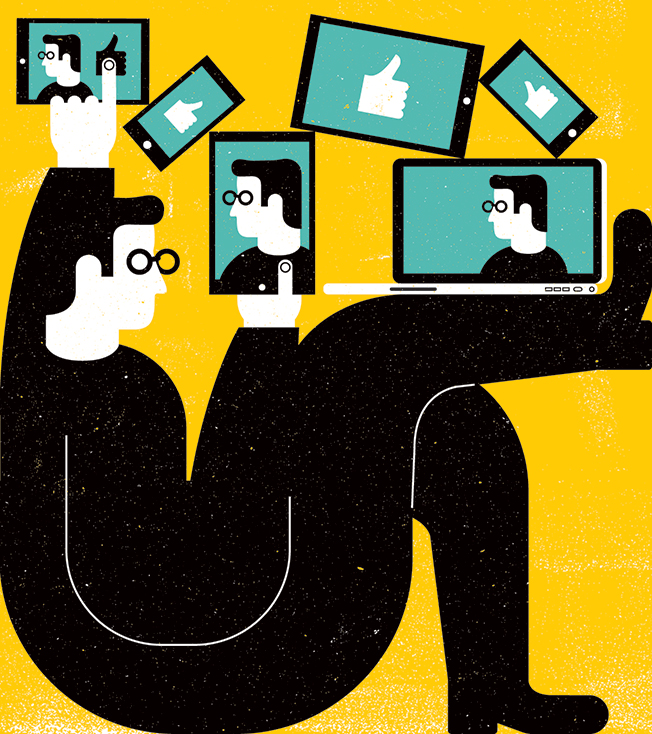Inspiration meets innovation at Brandweek, the ultimate marketing experience. Join industry luminaries, rising talent and strategic experts in Phoenix, Arizona this September 23–26 to assess challenges, develop solutions and create new pathways for growth. Register early to save.
Hardly a day goes by without a new missive on the apparently troubling task of teaching, managing or marketing to millennials. Our elders—including many on this week's Adweek Power List—are practically beating themselves up trying to figure us out, and it all makes me wonder whether this is merely a routine exercise or if we actually are an anomalous new subspecies designed to annoy with our selfies and sexting.

Daniel Haack
I wanted to get to the bottom of it all, so I reached out to my network for a wholly unscientific survey that asked the question: What is the deal with millennials? Armed with some illuminating responses from the over-30 crowd, I began to question why the onus was always on them to change. Maybe instead of corporate culture kowtowing to our needs, it was our turn to step up.
With that in mind, I listened to the old-timers' feedback and put together a list of the most common behaviors that seemed to really get their goat, and what we can do to fix them.
We need constant feedback. Let's face it: Millennials really, really like our pats on the back. As someone who still has boxes in storage at his parents' house filled with both real trophies but also non-award awards like "Certificate of Completion," I get it. We like being special, but our managers can't be wasting their workdays coddling us. We need to be OK with the idea that sometimes, a job well done is its own reward (not to mention our actual reward: a paycheck).
But we can't take criticism. Our entire lives, we've been told we're perfect—by parents, teachers, pop music, Glee—and that anyone who says otherwise is a hater that just needs to step aside. It's no surprise, then, that millennials struggle when it comes to criticism, even the constructive sort. Still, I'd wager that all on this week's Power List have faced their share of negative feedback throughout their lives, and are better leaders for it.
We think we know everything. There's something to be said about projecting confidence, but based on my survey responses, it appears we are going way overboard and annoying everyone by being little Mr. and Ms. Know-It-Alls. Even worse, this means we're not open to new information, which is probably the stupidest approach anyone could take in this rapidly changing world. Let's show them what we know, but also ask questions, read up, take classes and generally not be dismissive.
We lack patience. Totally bombarded by stimuli, we're easily distracted and easily bored. So many people I talked to lamented how often millennials lack the wherewithal to follow through on their great ideas (while of course still expecting a yearly promotion). We need to remember and acknowledge that if we want those gold stars, we have to earn them—and sometimes that takes time.
We don't know our audience. For millennials, the idea of too much information is a joke. However, while social media and reality TV have made it somewhat normal to expose all the salacious details of our lives for public consumption, many people unfortunately don't want to hear about our latest Tinder hook-up or drunken mishap, especially in the workplace.
We are ageist. This was the most surprising thing I learned—and the most alarming. As a generation, we embrace diversity (in theory), but it seems we're failing to extend this same inclusivity to those even just a few years older. Maybe once we overcome the notion that the industry is nothing without our fresh perspective, we can truly appreciate the power of experience and see Xers, boomers and beyond as an incredible source of knowledge.
The thing is, though, for all the headaches millennials may cause, my oldster network was emphatic about the myriad reasons why they still actually really like us. They mentioned things that make us better workers, like our need to impress, willingness to say yes and our confidence, which means we believe we can do anything and are willing to try it. Then, there's what makes us uniquely valuable: our digital nativity and how comfortable we are working across borders and with all different types of people. And most importantly, they see that we're good citizens, in how we champion diversity and care about things like social responsibility and work-life balance.
Maybe if we emphasize these incredible traits, while working to remedy our more problematic behaviors, we can accomplish some pretty amazing things. We may never be the Greatest Generation, but we can at least be a pretty good one, and I think we're OK with that (as long as we all get trophies for it, right?).
Mostly, though, I really just hope some of you take this to heart and think more carefully about how we're all perceived. Because honestly, if another person calls us all lazy, entitled narcissists, I swear, I just literally can't even.
Specs
Claim to fame Daniel Haack, director of U.S. marketing at MediaCom, was once called "Smarty McSmartster" on CBS' The Early Show.
Base New York
Twitter @danielhaack








